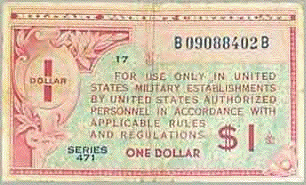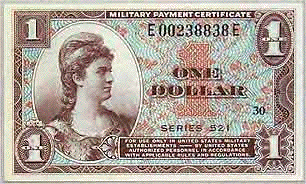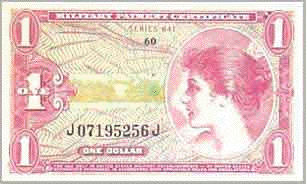Post WW II
Issued 16 September 1946, Withdrawn 10 March 1947

~ 720th Military Police Battalion Reunion Association History Project ~ |
The History of Military Payment Certificates |
Military Payment Certificates, called "MPC, Script, Funny Money" for short, actually started with United States Small Size Currency HAWAII brown seal and over stamp, and NORTH AFRICA yellow seal notes. HAWAII notes were created, after the Japanese bombed Pearl Harbor, Hawaii, and the US Government feared an imminent invasion of the islands. They had the series 1935A $1 through $20 notes over stamped with HAWAII so that if/should the Japanese invade the islands, they couldn't counterfeit large sums of currency and devalue the economic status of the US. |
The North Africa yellow seal notes, however, were specifically designed for soldiers serving on the continent of Africa during our involvement in World War II. These notes were brought over by soldiers for the purchasing of toiletries and personal supplies. The reason for the yellow seal, instead of the regular blue, was so that the Germans, upon capturing soldiers with the yellow seal notes, couldn't counterfeit large sums of money and devalue our economic status. |
After the US was no longer considered to be "occupying" a country, our soldiers were stationed there to protect our interests. This is when Military Payment Certificates were created. |
The first series 461, was issued on 16 September 1946 in Austria, Belgium, England, France, Germany, Greece, Hungary, Iceland, Italy, Japan, Korea, Morocco, Netherlands, Philippines, Ryukyus (Japanese Islands), Scotland, Trieste, and Yugoslavia. |
After a predetermined period of time, Series 461 was withdrawn from circulation on 10 March 1947. Series 471 was issued the same day series 461 was withdrawn from circulation. These days were called "Conversion Days"or "C Days" for short. And on the these days, military personnel, traded in the current circulating issue for a freshly released issue. There were two purposes for this: 1) Counterfeiters not being able to mass produce the issue in circulation, and if they did, it wasn't good for very long and; 2) Black Marketers were not able to use a previous issue as change for merchandise. These issues were replaced on a frequent basis, but never with a exact span of time. Some issues were valid for 6 months, some a year, and anywhere in between. The Conversion days, which were top secret, made it so finance officers, and paymasters, were not told of the conversion until 2-3 days prior to the change, this for security reasons. US MPC continued through the end of the Vietnam War with Series 692. |
| There were 13 series issued and used in 22 different countries: Austria, Belgium, Cyprus, England, France, Germany, Greece, Hungary, Iceland, Northern Ireland, Italy, Japan, Korea, Libya, Morocco, Netherlands, Philippines, Ryukyus (Japanese Islands), Scotland, Trieste, South Vietnam and Yugoslavia, not in all countries at the same time however. |
Military Payment Certificates Issued From 1946 through 1973 |
Series 461 Post WW II Issued 16 September 1946, Withdrawn 10 March 1947 |
 |
Series 471 Issued 10 March 1947, Withdrawn 1948 |
 |
Series 472 Series information unknown |
 |
Series 481 Korean War Issued 1951, Withdrawn 1954 |
 |
Series 521 Issued 1954, Withdrawn 1958 |
 |
Series 541 Issued 1958, Withdrawn 1961 |
 |
Series 591 Issued 1961, Withdrawn 1964 |
 |
* Series 611 Vietnam War - Issued 1964, Withdrawn 1969 * Was in issue in other U.S. Military theaters after the start of troop assignments to South Vietnam. |
 |
Series 641 Vietnam War Issued 31 August 1965, Withdrawn 21 Oct 1968 |
 |
Series 651 Series information unknown. |
 |
Series 661 Vietnam War - Issued 21 Oct 1968, Withdrawn 11 August 1969 |
 |
Series 681 Vietnam War Issued 11 August 69, Withdrawn 7 Oct 1970 |
 |
Series 692 Vietnam War Issued 7 Oct 1970 Withdrawn ( Fractional's .05 .10 .25 .50 ) 1 June 1971 ( Dollars ) 15 Mar 1973 |
 |
After the Vietnam War MPC was never again issued, and the concept lay dormant until the late '90s when it was replaced by a Stored Value Card system, presently used by U.S. armed forces in Iraq. |
Use Your Browser Button To Return |